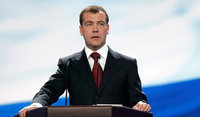Medvedev goes to United Russia
Russia is getting to the heart of political practice, as the president is preserves his non-party status and the Head of the Government relies on the parliamentary majority; defeating the party in the Duma elections. Vladimir Putin, after his inauguration of the Presidential post, will abandon his post as Chairman of "United Russia". The members of the "United Russia" party have appointed Dmitry Medvedev in his place.

On Tuesday, Putin declared his readiness to step down as Chairman in a meeting with leaders of the Party. "After the inauguration, which will take place on the 7th May this year, I think that it is the right thing to do to step down as Chairman of "United Russia", Putin said.
"I will ask you and members of the Party to call an unscheduled conference in the second half of May to the effect that Dmitry Medvedev will head the "United Russia" Party in the Russian Duma elections, and also with respect to the fact that I will be nominating him for the position of Chairman of the Government if I deem it to be appropriate, and if he had run the Party," Putin continued.
Putin maintains that it is a worldwide practice that the "government relies on the parliamentary majority." "Only in this way can we achieve effective, shared tasks," the Prime Minister emphasised. Aside from that, Putin noted that a certain kind of tradition has started to develop in Russia, where the president has become a "post-party figure". "The constitution does not prohibit the president from being a member of any party, and it is in this vein that we have developed in our political career. The president is a consolidatory figure for all political parties, and for all citizens of Russia," Putin is quoted as saying to "Interfax".
In turn, Boris Grizlov, High Advisor to the President of United Russia has no doubt that Medvedev will be unanimously elected as leader of the Party in the upcoming conference."The conference will be in May and our proposal to elect him as the leader of the Party will be supported by all of our parties, and by all the delegations at the conference," said Grizov on Tuesday at a meeting of the leaders of "United Russia" with Putin.
Aleksandr Tochenov, Director of ANO (The Autonomous Non-Commercial Organisation) at the "Centre of Applied Research and Programming" sees a certain logic in the forthcoming "reshuffle". "Putin, the future President, always said, 'I am a a post-party figure'. So did Medvedev," said the political commentator in an interview with Pravda.ru. "The President should have contact with all the parties on the political scene, those that are here at the moment and those that will appear in the future. It's the right thing to do for our political system," the expert claimed.
Aleksandr Zudin, Deputy Director of the Centre of Political Trends, notes that Russia is getting ever closer to world practice. "In parliamentary systems, the leader of the party is the Prime Minister," he said in an interview with Pravda.ru. "These things coincide. In any case, the Prime Minister can rely on the party's majority. It strengthens his position and increases his autonomy."
«If we compare Medvedev, the future Prime Minister of the Party, with some other Russian Prime Ministers from history, they relied less so on the party majority, but more on the President directly. And it was only through him that you could obtain a party majority," clarified the political commentator, underscoring the fact that it is not worth drawing any direct parallels between the Russian system and world practice. Russia is not a parliamentary system, but a presidential-parliamentary one, he reminded us.
According to Zudin, the first stage of political practice is when the President preserves his post-party status, and the head of the Government relies on the powers of the Party, a process which has already developed in Russia. "Under Putin there were a few deviations, since it was necessary to consolidate the political system," the expert claimed. '"This is now the first stage of the practicalities; the "post-party President" is now being established. And the most interesting thing is that the second stage has started to appear; the Prime Minister is relying on a party majority in the State Duma."
Upon discussing various perspectives of the members of "United Russia", headed by Medvedev, Aleksandr Tochenov has noted that the so-called "old hats" of the Party, it would most likely be a disadvantage. However, for the "United Russia" members of tomorrow, I think it would be a major plus," Tochenov suggested. Along with this, he suggested that the new Chairman of the party would be able to help unite existing inter-party friction. "The question is whether Medvedev will be able to unite all these different factions and people who are coming from different directions, whether he is going to become the leader and supporter of one of them or, most likely, the of right-wing liberal values.?
Zudin suggested that the Medvedev leadership is capable of governing "United Russia". "We are on the brink of great change," with the new incentive. "The leadership change over will ensure that 'United Russia' will be placed on a course of irreversible change. It will completely alter the party," he said.
Experts have noted that, in this case, it is worth discussing not only how Medvedev will influence "United Russia" but also how "United Russia", which has the party majority, is capable of influencing Medvedev's image. "United Russia" is a centrist party, and does not exclude the fact that they require a definitive reconfiguration of their image from Medvedev, whose own image is a little displaced in the centre-right parties. Medvedev must then work in compliance with two images; the general party image and his image as a leader," summarised Zudin.
Pravda.Ru
Translated by Emily Ferris
Subscribe to Pravda.Ru Telegram channel, Facebook, RSS!




